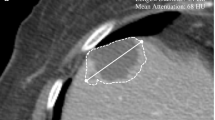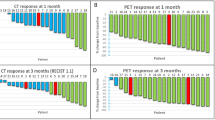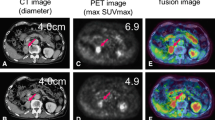Abstract
Purpose
To determine whether 2D or 3D Choi and modified Choi (mChoi) criteria could assess the efficacy of everolimus against metastatic renal cell carcinoma (mRCC).
Methods
RECIST-1.1, Choi, and mChoi criteria were applied retrospectively to analyse baseline and 2-month contrast-enhanced computed tomography (CECT) images in 48 patients with mRCC enrolled in the everolimus arm of the French randomized double-blind multicentre phase III trial comparing everolimus versus placebo (RECORD-1). The primary endpoint was centrally reviewed progression-free survival (PFS) calculated from the initial RECORD-1 analysis. Mean attenuation was determined for 2D target lesion regions of interest drawn on CECT sections whose largest diameters had been measured, and for the 3D whole target lesion.
Results
The median PFS was 5.5 months. The median PFS for everolimus responders defined using 3D mChoi criteria was significantly longer than for non-responders (7.6 versus 5.4 months, respectively), corresponding to a hazard ratio for progression of 0.45 (95 % CI: 0.22–0.92), with respective 1-year survival rates of 31 % and 9 %. No other 2D or 3D imaging criteria at 2 months identified patients who would benefit from everolimus.
Conclusions
At 2 months, only 3D mChoi criteria were able to identify mRCC patients with a PFS benefit from everolimus.
Key points
• Choi criteria could not identify everolimus-treated patients with significantly prolonged PFS.
• mCHOI enabled identification of everolimus-treated mRCC patients with a PFS benefit.
• 3D attenuation measurement criteria appeared to perform better than single-slice measurement.




Similar content being viewed by others
Abbreviations
- mChoi:
-
Modified Choi
- mRCC:
-
Metastatic renal cell carcinoma
- RECIST:
-
Response Evaluation Criteria in Solid Tumours
- CECT:
-
Contrast-enhanced computed tomography
- PFS:
-
Progression-free survival
- GIST:
-
Gastrointestinal stromal tumour
- TKI:
-
Tyrosine-kinase inhibitor
- PR:
-
Partial response
- ROI:
-
Region of interest
- HU:
-
Hounsfield units
- AOI:
-
Area of interest
- VOI:
-
Volume of interest
- HR:
-
Hazard ratio
- CI:
-
Confidence interval
- MASS:
-
Morphology, attenuation, size and structure criteria
- MSKCC:
-
Memorial Sloan–Kettering Cancer Center
- PS:
-
Performance status
- SACT:
-
Size and attenuation CT measurement
- SD:
-
Standard deviation
References
Therasse P, Arbuck SG, Eisenhauer EA et al (2000) New guidelines to evaluate the response to treatment in solid tumors. European Organization for Research and Treatment of Cancer, National Cancer Institute of the United States, National Cancer Institute of Canada. J Natl Cancer Inst 92:205–216
Choi H, Charnsangavej C, Faria SC et al (2007) Correlation of computed tomography and positron emission tomography in patients with metastatic gastrointestinal stromal tumor treated at a single institution with imatinib mesylate: proposal of new computed tomography response criteria. J Clin Oncol 25:1753–1759
Smith AD, Shah SN, Rini BI et al (2010) Morphology, attenuation, size, and structure (MASS) criteria: assessing response and predicting clinical outcome in metastatic renal cell carcinoma on antiangiogenic targeted therapy. AJR Am J Roentgenol 194:1470–1478
Schmidt N, Hess V, Zumbrunn T et al (2013) Choi response criteria for prediction of survival in patients with metastatic renal cell carcinoma treated with anti-angiogenic therapies. Eur Radiol 23:632–639
Van der Veldt M, Meijerink MR, van den Eertwegh JM et al (2010) Choi response criteria for early prediction of clinical outcome in patients with metastatic renal cell cancer treated with sunitinib. Br J Cancer 102:803–809
Krajewski KM, Guo M, Van den Abbeele AD et al (2011) Comparison of four early posttherapy imaging changes (EPTIC; RECIST 1.0, tumor shrinkage, computed tomography tumor density, Choi criteria) in assessing outcome to vascular endothelial growth factor-targeted therapy in patients with advanced renal cell cancer. Eur Urol 59:856–862
Nathan PD, Vinayan A, Stott D et al (2010) CT response assessment combining reduction in both size and arterial phase density correlates with time to progression in metastatic renal cancer patients treated with targeted therapies. Cancer Biol Ther 9:15–19
Krajewski KM, Franchetti Y, Nishino M et al (2014) 10 % Tumor diameter shrinkage on the first follow-up computed tomography predicts clinical outcome in patients with advanced renal cell carcinoma treated with angiogenesis inhibitors: a follow-up validation study. Oncologist 19:507–514
Motzer RJ, Escudier B, Oudard S et al (2008) Efficacy of everolimus in advanced renal cell carcinoma: a double-blind, randomised, placebo-controlled phase III trial. Lancet 372:449–456
Motzer RJ, Escudier B, Oudard S et al (2010) Phase 3 trial of everolimus for metastatic renal cell carcinoma: final results and analysis of prognostic factors. Cancer 116:4256–4265
Oudard S, Thiam R, Fournier LS et al (2012) Optimisation of the tumour response threshold in patients treated with everolimus for metastatic renal cell carcinoma: analysis of response and progression-free survival in the RECORD-1 study. Eur J Cancer 48:1512–1518
Eisenhauer E, Therasse P, Bogaerts J et al (2009) New response evaluation criteria in solid tumours: revised RECIST guideline (version 1.1). Eur J Cancer 45:228–247
Stacchiotti S, Verderio P, Messina A et al (2012) Tumor response assessment by modified Choi criteria in localized high-risk soft tissue sarcoma treated with chemotherapy. Cancer 118:5857–5866
Liu K, Li G, Fan C et al (2012) Adapted Choi response criteria for prediction of clinical outcome in locally advanced gastric cancer patients following preoperative chemotherapy. Acta Radiol 53:127–134
Smith AD, Lieber ML, Shah SN (2010) Assessing tumor response and detecting recurrence in metastatic renal cell carcinoma on targeted therapy: importance of size and attenuation on contrast-enhanced CT. AJR Am J Roentgenol 194:157–165
Acknowledgments
The scientific guarantor of this publication is Prof. Olivier Lucidarme. O. Lucidarme declares relationships with the following companies: Boehringer Ingelheim, Roche, Bracco, Novartis, and Pfizer. S. Oudard declares relationships with the following companies: Novartis, Pfizer, Bayer, and Roche. K. Slimane is an employee of Novartis. The other authors of this manuscript declare no relationships with any companies whose products or services may be related to the subject matter of the article. The authors state that this work has not received any funding. One of the authors (Reza Elaidi) has significant statistical expertise. Institutional review board approval was not required because this was a retrospective study, and written informed consent was waived by the institutional review board. Some study subjects or cohorts were previously reported in three papers:
Motzer RJ, Escudier B, Oudard S et al. (2008) Efficacy of everolimus in advanced renal cell carcinoma: a double-blind, randomised, placebo-controlled phase III trial. Lancet 372:449–56
Motzer RJ, Escudier B, Oudard S et al. (2010) Phase 3 trial of everolimus for metastatic renal cell carcinoma: final results and analysis of prognostic factors. Cancer 116:4256–65
Oudard S, Thiam R, Fournier LS et al. (2012) Optimisation of the tumour response threshold in patients treated with everolimus for metastatic renal cell carcinoma: analysis of response and progression-free survival in the RECORD-1 study. Eur J Cancer 48:1512–8
Methodology: retrospective, multicenter study.
Author information
Authors and Affiliations
Corresponding author
Rights and permissions
About this article
Cite this article
Lamuraglia, M., Raslan, S., Elaidi, R. et al. mTOR-inhibitor treatment of metastatic renal cell carcinoma: contribution of Choi and modified Choi criteria assessed in 2D or 3D to evaluate tumor response. Eur Radiol 26, 278–285 (2016). https://doi.org/10.1007/s00330-015-3828-7
Received:
Revised:
Accepted:
Published:
Issue Date:
DOI: https://doi.org/10.1007/s00330-015-3828-7




